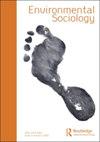Farm level adaptation to climate change in north China: behavioural practices and potential drivers
IF 2.8
Q3 ENVIRONMENTAL STUDIES
引用次数: 0
Abstract
ABSTRACT Climate change has profound impacts on agricultural production, to which farmers must adapt, but the role of farmers in climate change adaptation is largely unaddressed. This research targeted to construct an integrated picture of the farm level adaptation to climate change in north China. We performed a field survey in Hebei province, and uncover which farmer behaviours in reality constitute an adaptation and analyses the characteristics and heterogeneity of these behaviours. The results show that farmer adaptation is mostly limited to spontaneous behavioural adjustment. The most widely adopted adaptation strategy remains the use of fertilisers, pesticides and irrigation techniques that were widely used, whilst the adoption of advanced adaptation technologies is not yet sufficient. Farming experience and involvement into off-farm work probably restrict farmers’ involvement in adaptation. Farmers’ perception of climate change risks and recognition of the effectiveness of adaptation would drive the adoption of adaptation strategies, however, obstacles remain with regards to the availability of policy, technology, and infrastructure support at government level. The study recommends that governments need to provide more adaptation support while also focus on the dissemination of information on adaptation provision, as well as strengthen people’s perceptions of climate risks and the effectiveness of adaptation.中国北方农场层面对气候变化的适应:行为实践和潜在驱动因素
摘要气候变化对农业生产有着深远的影响,农民必须适应,但农民在适应气候变化中的作用在很大程度上没有得到解决。本研究旨在构建一幅中国北方农业层面适应气候变化的综合图景。我们在河北省进行了一项实地调查,揭示了现实中哪些农民行为构成了适应性,并分析了这些行为的特征和异质性。结果表明,农民的适应大多局限于自发的行为调整。采用最广泛的适应战略仍然是使用广泛使用的化肥、杀虫剂和灌溉技术,而采用先进的适应技术还不够。农业经验和参与非农业工作可能会限制农民参与适应。农民对气候变化风险的认识和对适应有效性的认识将推动采取适应战略,然而,在政府层面提供政策、技术和基础设施支持方面仍然存在障碍。该研究建议,各国政府需要提供更多的适应支持,同时注重传播有关适应的信息,并加强人们对气候风险和适应有效性的认识。
本文章由计算机程序翻译,如有差异,请以英文原文为准。
求助全文
约1分钟内获得全文
求助全文
来源期刊

Environmental Sociology
ENVIRONMENTAL STUDIES-
CiteScore
4.60
自引率
12.00%
发文量
34
期刊介绍:
Environmental Sociology is dedicated to applying and advancing the sociological imagination in relation to a wide variety of environmental challenges, controversies and issues, at every level from the global to local, from ‘world culture’ to diverse local perspectives. As an international, peer-reviewed scholarly journal, Environmental Sociology aims to stretch the conceptual and theoretical boundaries of both environmental and mainstream sociology, to highlight the relevance of sociological research for environmental policy and management, to disseminate the results of sociological research, and to engage in productive dialogue and debate with other disciplines in the social, natural and ecological sciences. Contributions may utilize a variety of theoretical orientations including, but not restricted to: critical theory, cultural sociology, ecofeminism, ecological modernization, environmental justice, organizational sociology, political ecology, political economy, post-colonial studies, risk theory, social psychology, science and technology studies, globalization, world-systems analysis, and so on. Cross- and transdisciplinary contributions are welcome where they demonstrate a novel attempt to understand social-ecological relationships in a manner that engages with the core concerns of sociology in social relationships, institutions, practices and processes. All methodological approaches in the environmental social sciences – qualitative, quantitative, integrative, spatial, policy analysis, etc. – are welcomed. Environmental Sociology welcomes high-quality submissions from scholars around the world.
 求助内容:
求助内容: 应助结果提醒方式:
应助结果提醒方式:


